Legal Suit Against Uber in Australia: An Ethical Decision Making Process
VerifiedAdded on 2022/11/03
|11
|2412
|239
AI Summary
The report focuses on a legal suit against Uber filed by taxi, hire cab, chartered vehicle, limousine drivers and license owners of Australia. The report discusses the ethical decision making process and suggests an ethical judgement to the case. The report also discusses the available options and possible consequences and chooses the best option. The report concludes by stating that the company should terminate the drivers of the company who do not comply with license and accreditation requirements and accordingly providing employment opportunities to the cab drivers and license owners of Australia who have been negatively affected by the activities of the company.
Contribute Materials
Your contribution can guide someone’s learning journey. Share your
documents today.
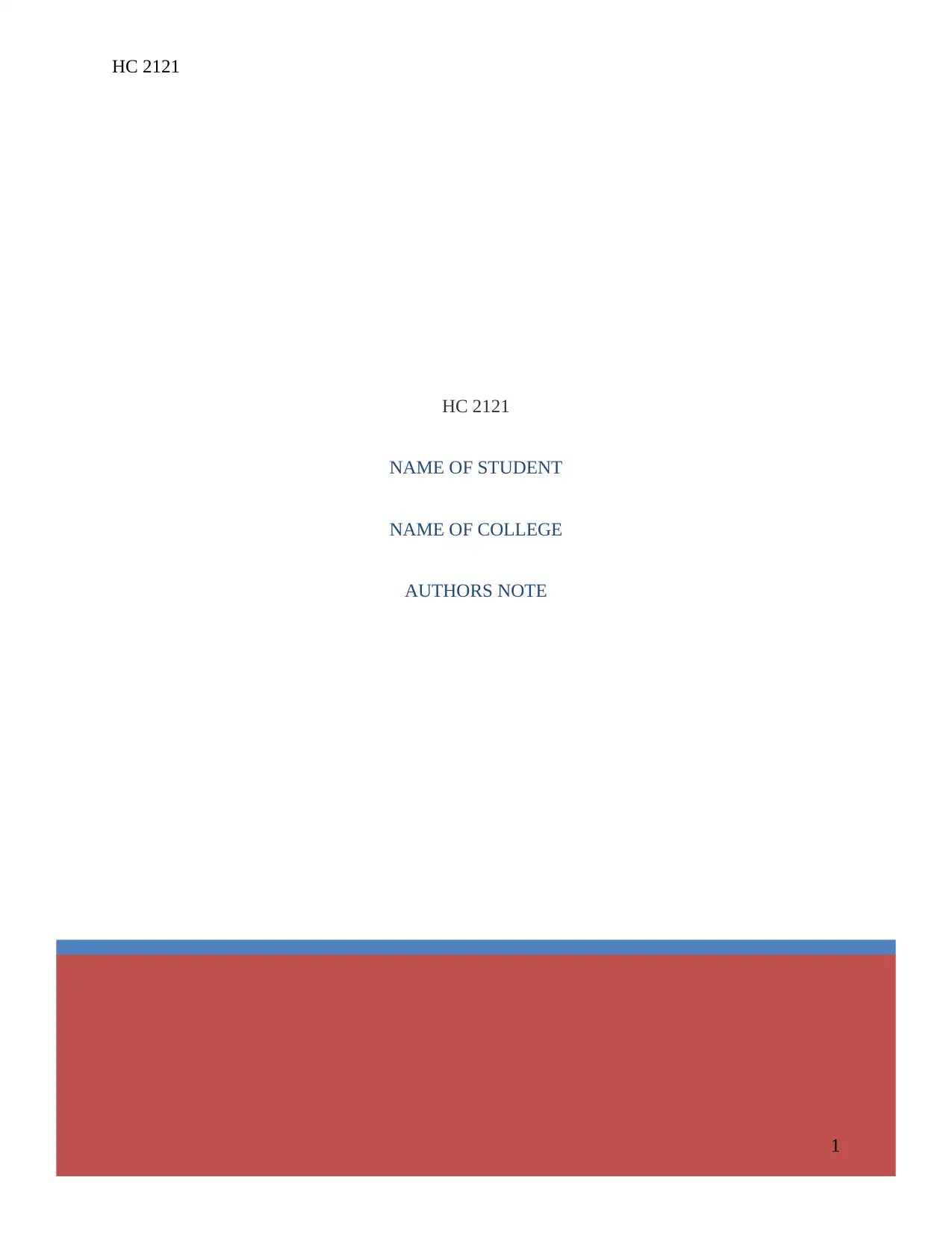
HC 2121
NAME OF STUDENT
NAME OF COLLEGE
AUTHORS NOTE
HC 2121
1
NAME OF STUDENT
NAME OF COLLEGE
AUTHORS NOTE
HC 2121
1
Secure Best Marks with AI Grader
Need help grading? Try our AI Grader for instant feedback on your assignments.
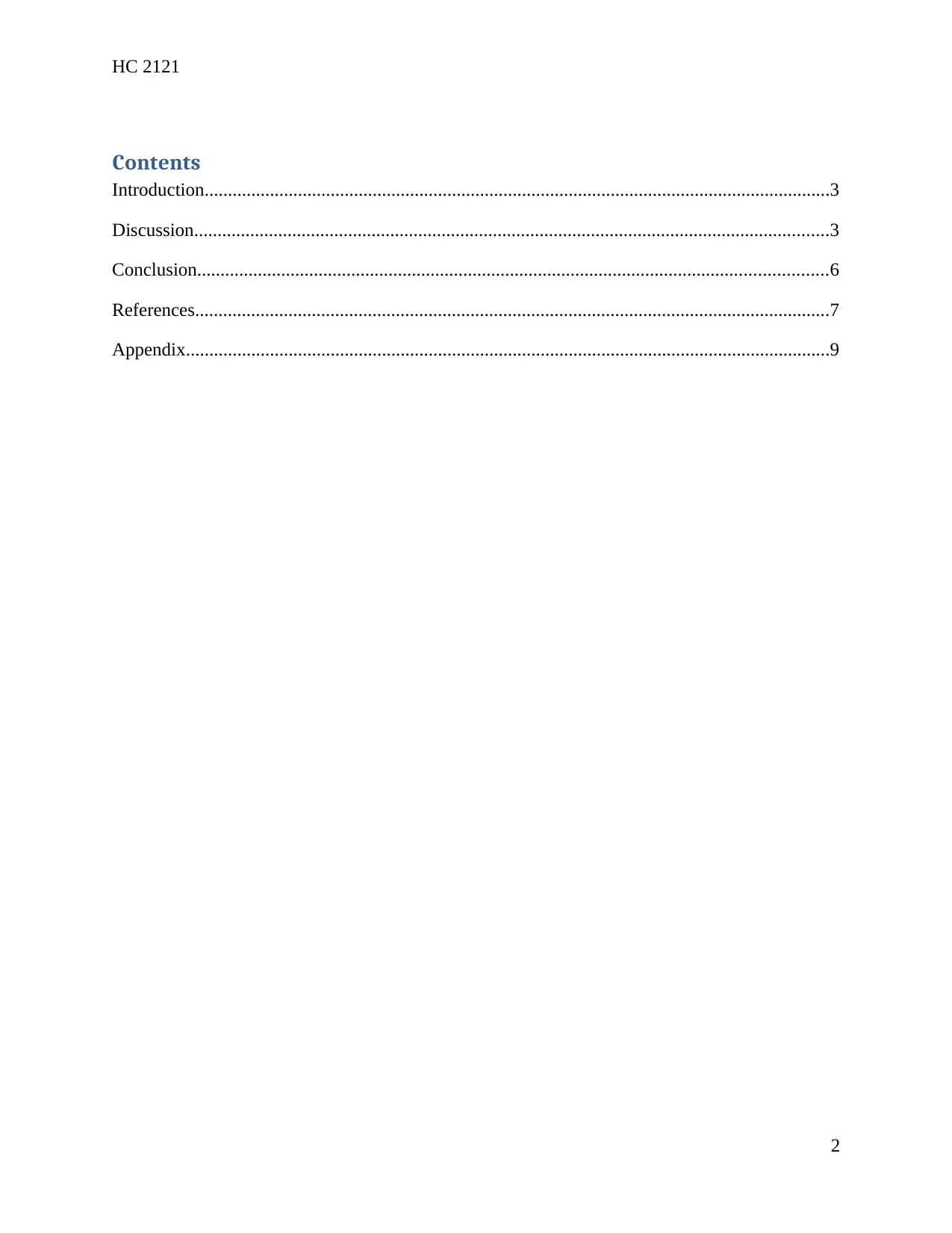
HC 2121
Contents
Introduction......................................................................................................................................3
Discussion........................................................................................................................................3
Conclusion.......................................................................................................................................6
References........................................................................................................................................7
Appendix..........................................................................................................................................9
2
Contents
Introduction......................................................................................................................................3
Discussion........................................................................................................................................3
Conclusion.......................................................................................................................................6
References........................................................................................................................................7
Appendix..........................................................................................................................................9
2
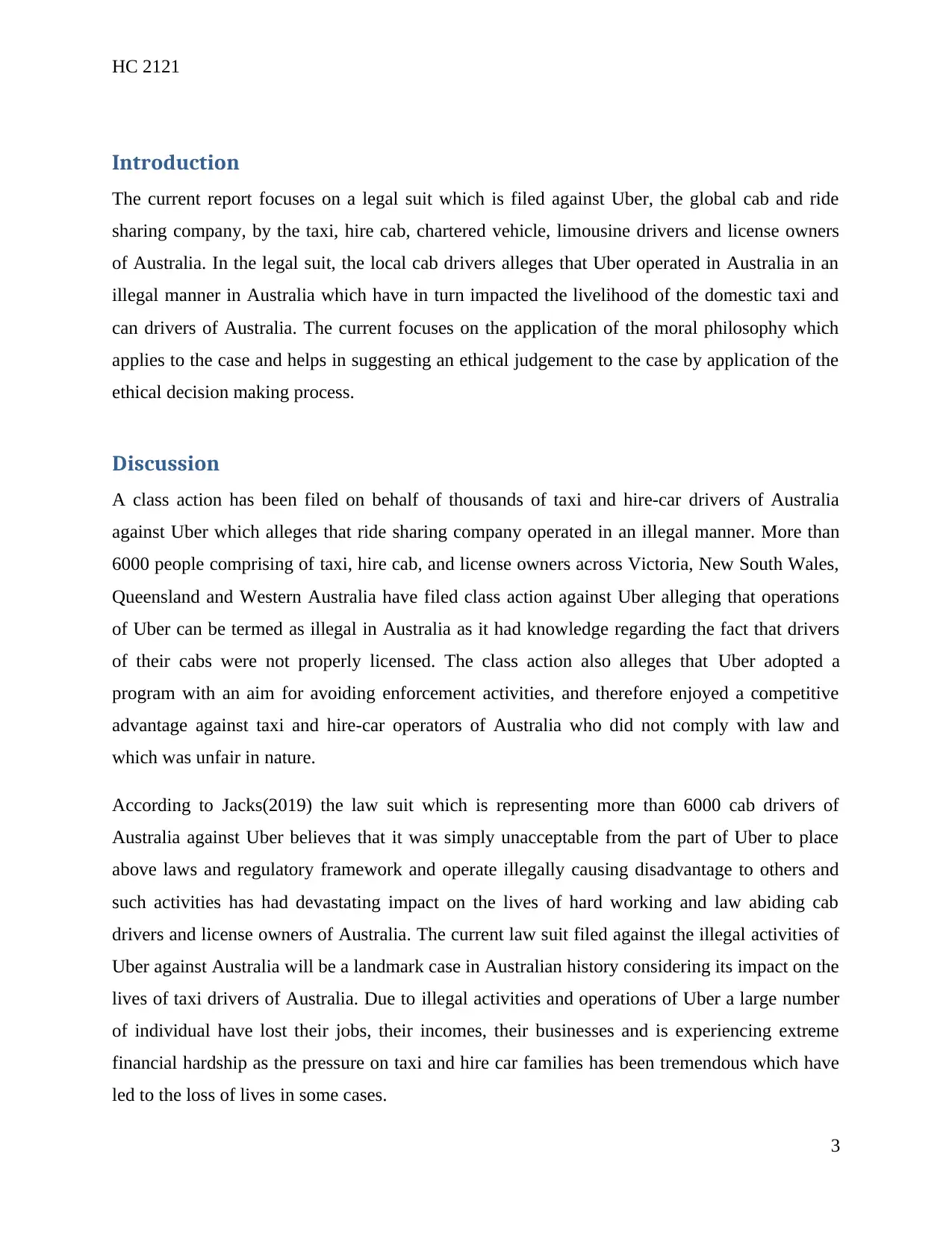
HC 2121
Introduction
The current report focuses on a legal suit which is filed against Uber, the global cab and ride
sharing company, by the taxi, hire cab, chartered vehicle, limousine drivers and license owners
of Australia. In the legal suit, the local cab drivers alleges that Uber operated in Australia in an
illegal manner in Australia which have in turn impacted the livelihood of the domestic taxi and
can drivers of Australia. The current focuses on the application of the moral philosophy which
applies to the case and helps in suggesting an ethical judgement to the case by application of the
ethical decision making process.
Discussion
A class action has been filed on behalf of thousands of taxi and hire-car drivers of Australia
against Uber which alleges that ride sharing company operated in an illegal manner. More than
6000 people comprising of taxi, hire cab, and license owners across Victoria, New South Wales,
Queensland and Western Australia have filed class action against Uber alleging that operations
of Uber can be termed as illegal in Australia as it had knowledge regarding the fact that drivers
of their cabs were not properly licensed. The class action also alleges that Uber adopted a
program with an aim for avoiding enforcement activities, and therefore enjoyed a competitive
advantage against taxi and hire-car operators of Australia who did not comply with law and
which was unfair in nature.
According to Jacks(2019) the law suit which is representing more than 6000 cab drivers of
Australia against Uber believes that it was simply unacceptable from the part of Uber to place
above laws and regulatory framework and operate illegally causing disadvantage to others and
such activities has had devastating impact on the lives of hard working and law abiding cab
drivers and license owners of Australia. The current law suit filed against the illegal activities of
Uber against Australia will be a landmark case in Australian history considering its impact on the
lives of taxi drivers of Australia. Due to illegal activities and operations of Uber a large number
of individual have lost their jobs, their incomes, their businesses and is experiencing extreme
financial hardship as the pressure on taxi and hire car families has been tremendous which have
led to the loss of lives in some cases.
3
Introduction
The current report focuses on a legal suit which is filed against Uber, the global cab and ride
sharing company, by the taxi, hire cab, chartered vehicle, limousine drivers and license owners
of Australia. In the legal suit, the local cab drivers alleges that Uber operated in Australia in an
illegal manner in Australia which have in turn impacted the livelihood of the domestic taxi and
can drivers of Australia. The current focuses on the application of the moral philosophy which
applies to the case and helps in suggesting an ethical judgement to the case by application of the
ethical decision making process.
Discussion
A class action has been filed on behalf of thousands of taxi and hire-car drivers of Australia
against Uber which alleges that ride sharing company operated in an illegal manner. More than
6000 people comprising of taxi, hire cab, and license owners across Victoria, New South Wales,
Queensland and Western Australia have filed class action against Uber alleging that operations
of Uber can be termed as illegal in Australia as it had knowledge regarding the fact that drivers
of their cabs were not properly licensed. The class action also alleges that Uber adopted a
program with an aim for avoiding enforcement activities, and therefore enjoyed a competitive
advantage against taxi and hire-car operators of Australia who did not comply with law and
which was unfair in nature.
According to Jacks(2019) the law suit which is representing more than 6000 cab drivers of
Australia against Uber believes that it was simply unacceptable from the part of Uber to place
above laws and regulatory framework and operate illegally causing disadvantage to others and
such activities has had devastating impact on the lives of hard working and law abiding cab
drivers and license owners of Australia. The current law suit filed against the illegal activities of
Uber against Australia will be a landmark case in Australian history considering its impact on the
lives of taxi drivers of Australia. Due to illegal activities and operations of Uber a large number
of individual have lost their jobs, their incomes, their businesses and is experiencing extreme
financial hardship as the pressure on taxi and hire car families has been tremendous which have
led to the loss of lives in some cases.
3
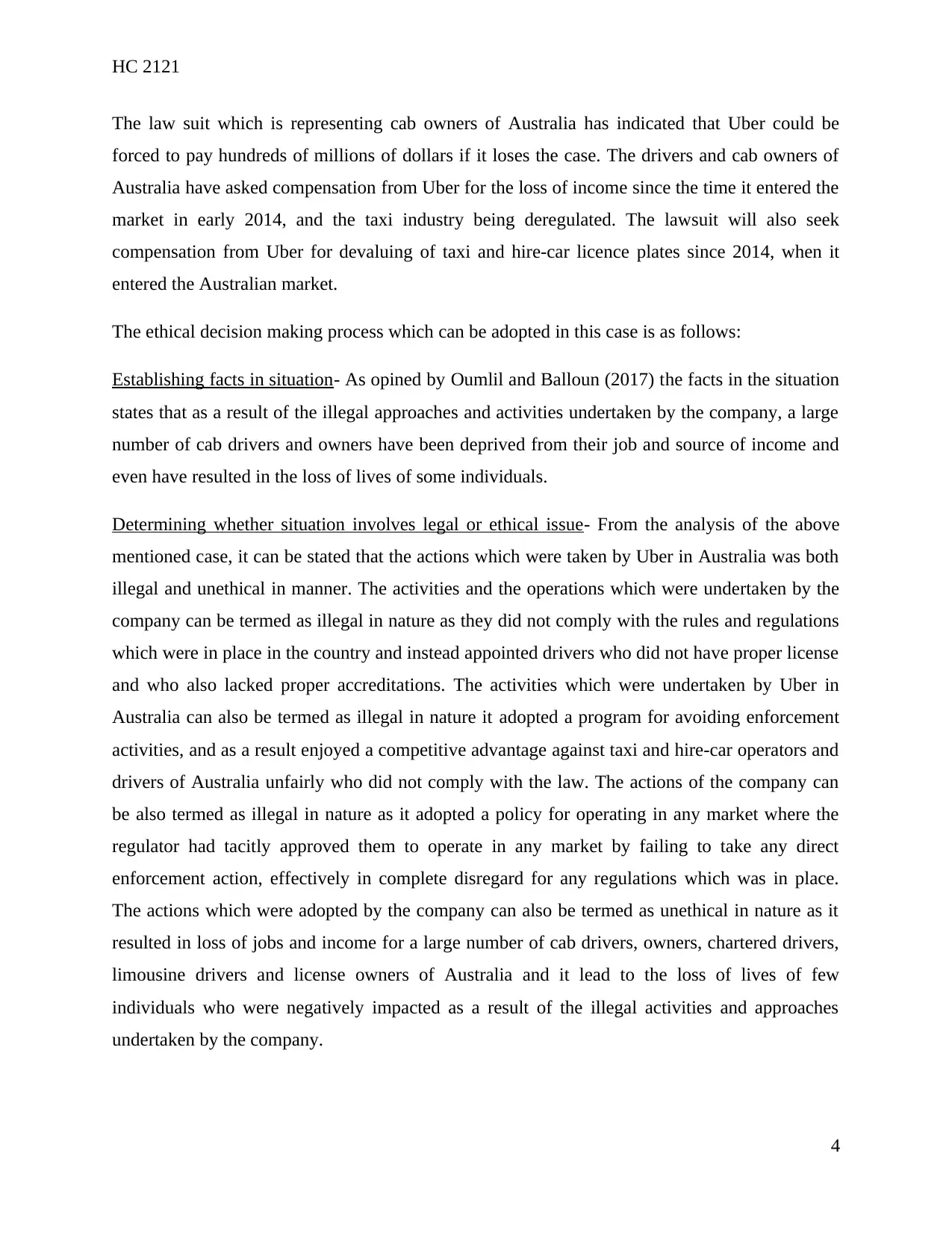
HC 2121
The law suit which is representing cab owners of Australia has indicated that Uber could be
forced to pay hundreds of millions of dollars if it loses the case. The drivers and cab owners of
Australia have asked compensation from Uber for the loss of income since the time it entered the
market in early 2014, and the taxi industry being deregulated. The lawsuit will also seek
compensation from Uber for devaluing of taxi and hire-car licence plates since 2014, when it
entered the Australian market.
The ethical decision making process which can be adopted in this case is as follows:
Establishing facts in situation- As opined by Oumlil and Balloun (2017) the facts in the situation
states that as a result of the illegal approaches and activities undertaken by the company, a large
number of cab drivers and owners have been deprived from their job and source of income and
even have resulted in the loss of lives of some individuals.
Determining whether situation involves legal or ethical issue- From the analysis of the above
mentioned case, it can be stated that the actions which were taken by Uber in Australia was both
illegal and unethical in manner. The activities and the operations which were undertaken by the
company can be termed as illegal in nature as they did not comply with the rules and regulations
which were in place in the country and instead appointed drivers who did not have proper license
and who also lacked proper accreditations. The activities which were undertaken by Uber in
Australia can also be termed as illegal in nature it adopted a program for avoiding enforcement
activities, and as a result enjoyed a competitive advantage against taxi and hire-car operators and
drivers of Australia unfairly who did not comply with the law. The actions of the company can
be also termed as illegal in nature as it adopted a policy for operating in any market where the
regulator had tacitly approved them to operate in any market by failing to take any direct
enforcement action, effectively in complete disregard for any regulations which was in place.
The actions which were adopted by the company can also be termed as unethical in nature as it
resulted in loss of jobs and income for a large number of cab drivers, owners, chartered drivers,
limousine drivers and license owners of Australia and it lead to the loss of lives of few
individuals who were negatively impacted as a result of the illegal activities and approaches
undertaken by the company.
4
The law suit which is representing cab owners of Australia has indicated that Uber could be
forced to pay hundreds of millions of dollars if it loses the case. The drivers and cab owners of
Australia have asked compensation from Uber for the loss of income since the time it entered the
market in early 2014, and the taxi industry being deregulated. The lawsuit will also seek
compensation from Uber for devaluing of taxi and hire-car licence plates since 2014, when it
entered the Australian market.
The ethical decision making process which can be adopted in this case is as follows:
Establishing facts in situation- As opined by Oumlil and Balloun (2017) the facts in the situation
states that as a result of the illegal approaches and activities undertaken by the company, a large
number of cab drivers and owners have been deprived from their job and source of income and
even have resulted in the loss of lives of some individuals.
Determining whether situation involves legal or ethical issue- From the analysis of the above
mentioned case, it can be stated that the actions which were taken by Uber in Australia was both
illegal and unethical in manner. The activities and the operations which were undertaken by the
company can be termed as illegal in nature as they did not comply with the rules and regulations
which were in place in the country and instead appointed drivers who did not have proper license
and who also lacked proper accreditations. The activities which were undertaken by Uber in
Australia can also be termed as illegal in nature it adopted a program for avoiding enforcement
activities, and as a result enjoyed a competitive advantage against taxi and hire-car operators and
drivers of Australia unfairly who did not comply with the law. The actions of the company can
be also termed as illegal in nature as it adopted a policy for operating in any market where the
regulator had tacitly approved them to operate in any market by failing to take any direct
enforcement action, effectively in complete disregard for any regulations which was in place.
The actions which were adopted by the company can also be termed as unethical in nature as it
resulted in loss of jobs and income for a large number of cab drivers, owners, chartered drivers,
limousine drivers and license owners of Australia and it lead to the loss of lives of few
individuals who were negatively impacted as a result of the illegal activities and approaches
undertaken by the company.
4
Secure Best Marks with AI Grader
Need help grading? Try our AI Grader for instant feedback on your assignments.
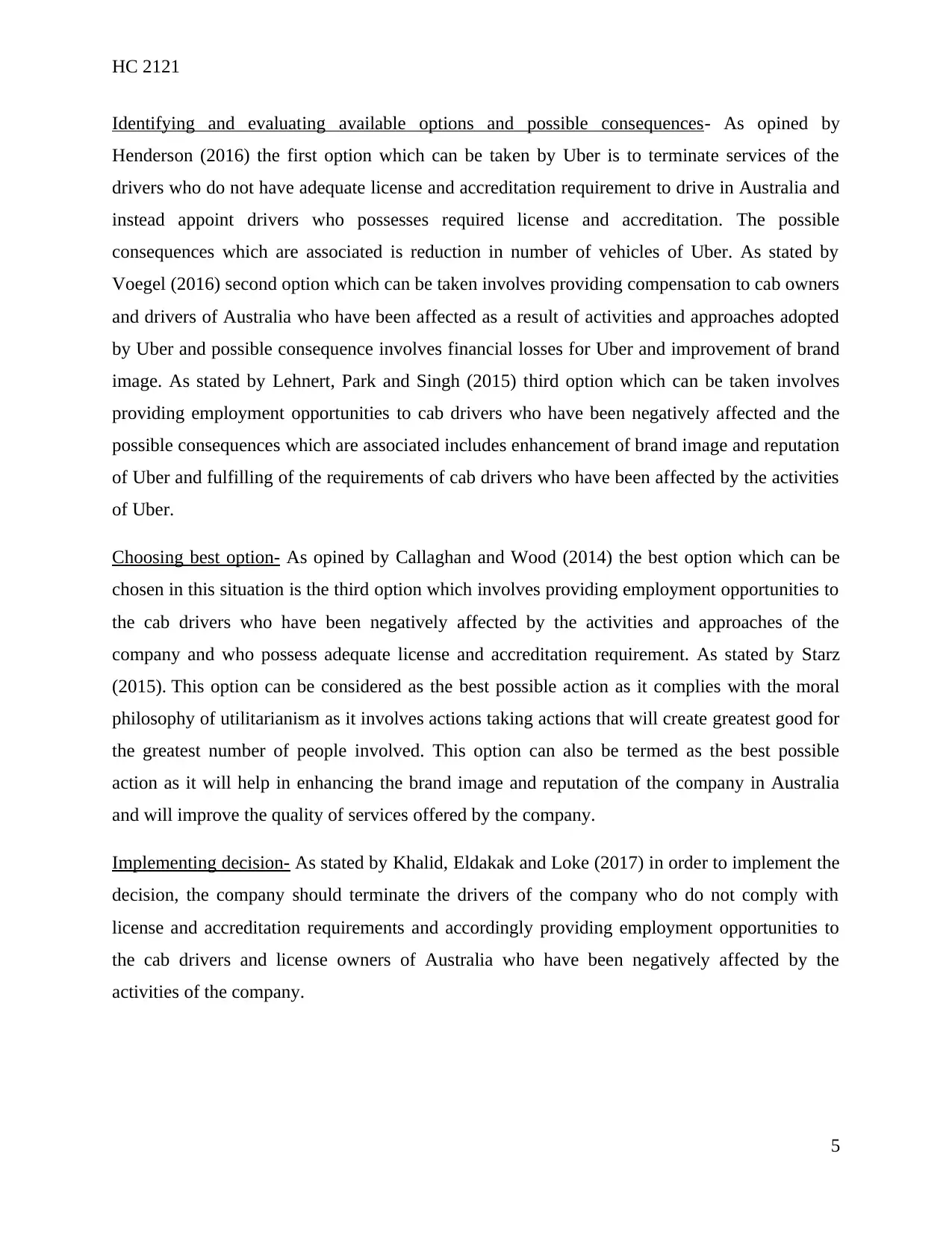
HC 2121
Identifying and evaluating available options and possible consequences- As opined by
Henderson (2016) the first option which can be taken by Uber is to terminate services of the
drivers who do not have adequate license and accreditation requirement to drive in Australia and
instead appoint drivers who possesses required license and accreditation. The possible
consequences which are associated is reduction in number of vehicles of Uber. As stated by
Voegel (2016) second option which can be taken involves providing compensation to cab owners
and drivers of Australia who have been affected as a result of activities and approaches adopted
by Uber and possible consequence involves financial losses for Uber and improvement of brand
image. As stated by Lehnert, Park and Singh (2015) third option which can be taken involves
providing employment opportunities to cab drivers who have been negatively affected and the
possible consequences which are associated includes enhancement of brand image and reputation
of Uber and fulfilling of the requirements of cab drivers who have been affected by the activities
of Uber.
Choosing best option- As opined by Callaghan and Wood (2014) the best option which can be
chosen in this situation is the third option which involves providing employment opportunities to
the cab drivers who have been negatively affected by the activities and approaches of the
company and who possess adequate license and accreditation requirement. As stated by Starz
(2015). This option can be considered as the best possible action as it complies with the moral
philosophy of utilitarianism as it involves actions taking actions that will create greatest good for
the greatest number of people involved. This option can also be termed as the best possible
action as it will help in enhancing the brand image and reputation of the company in Australia
and will improve the quality of services offered by the company.
Implementing decision- As stated by Khalid, Eldakak and Loke (2017) in order to implement the
decision, the company should terminate the drivers of the company who do not comply with
license and accreditation requirements and accordingly providing employment opportunities to
the cab drivers and license owners of Australia who have been negatively affected by the
activities of the company.
5
Identifying and evaluating available options and possible consequences- As opined by
Henderson (2016) the first option which can be taken by Uber is to terminate services of the
drivers who do not have adequate license and accreditation requirement to drive in Australia and
instead appoint drivers who possesses required license and accreditation. The possible
consequences which are associated is reduction in number of vehicles of Uber. As stated by
Voegel (2016) second option which can be taken involves providing compensation to cab owners
and drivers of Australia who have been affected as a result of activities and approaches adopted
by Uber and possible consequence involves financial losses for Uber and improvement of brand
image. As stated by Lehnert, Park and Singh (2015) third option which can be taken involves
providing employment opportunities to cab drivers who have been negatively affected and the
possible consequences which are associated includes enhancement of brand image and reputation
of Uber and fulfilling of the requirements of cab drivers who have been affected by the activities
of Uber.
Choosing best option- As opined by Callaghan and Wood (2014) the best option which can be
chosen in this situation is the third option which involves providing employment opportunities to
the cab drivers who have been negatively affected by the activities and approaches of the
company and who possess adequate license and accreditation requirement. As stated by Starz
(2015). This option can be considered as the best possible action as it complies with the moral
philosophy of utilitarianism as it involves actions taking actions that will create greatest good for
the greatest number of people involved. This option can also be termed as the best possible
action as it will help in enhancing the brand image and reputation of the company in Australia
and will improve the quality of services offered by the company.
Implementing decision- As stated by Khalid, Eldakak and Loke (2017) in order to implement the
decision, the company should terminate the drivers of the company who do not comply with
license and accreditation requirements and accordingly providing employment opportunities to
the cab drivers and license owners of Australia who have been negatively affected by the
activities of the company.
5
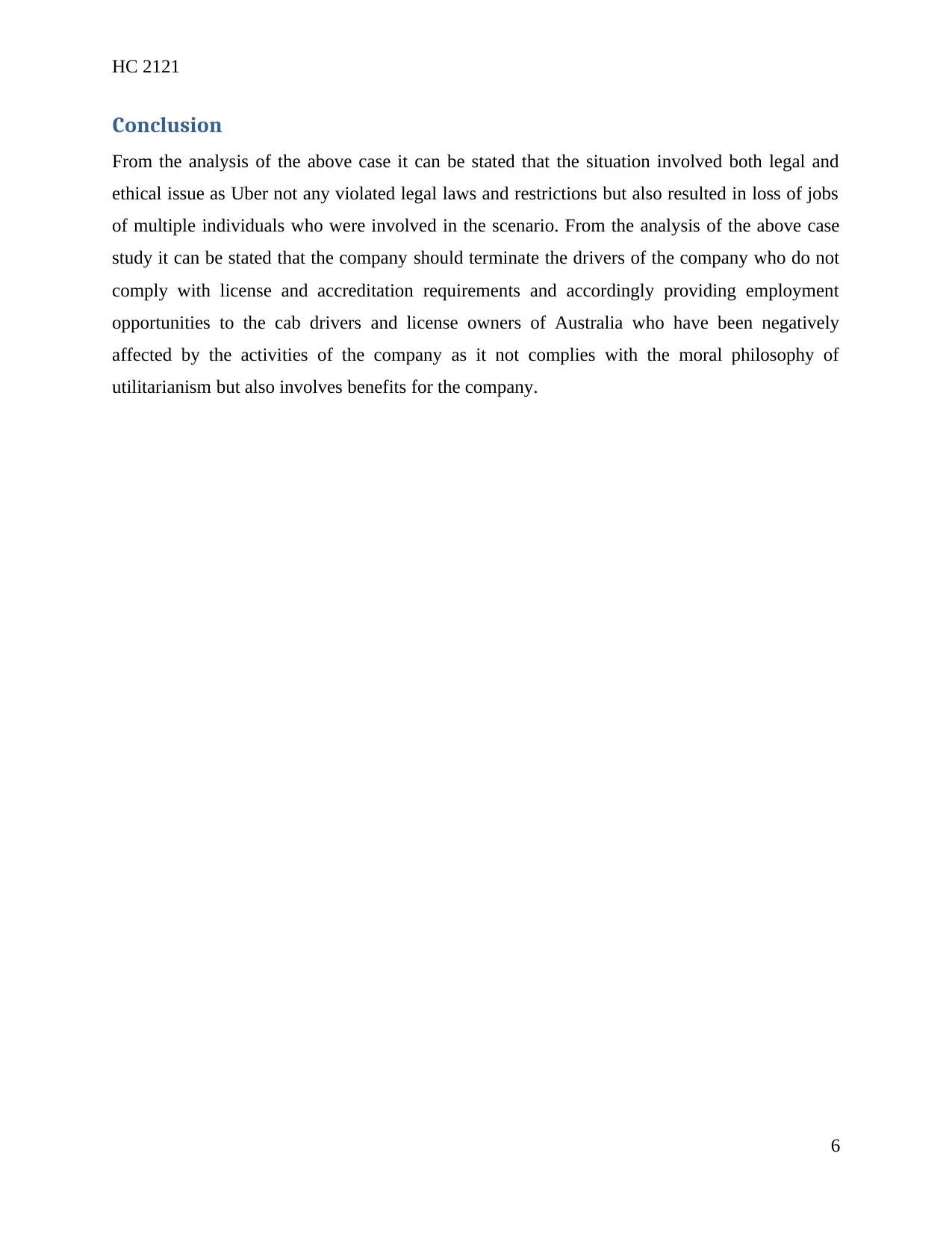
HC 2121
Conclusion
From the analysis of the above case it can be stated that the situation involved both legal and
ethical issue as Uber not any violated legal laws and restrictions but also resulted in loss of jobs
of multiple individuals who were involved in the scenario. From the analysis of the above case
study it can be stated that the company should terminate the drivers of the company who do not
comply with license and accreditation requirements and accordingly providing employment
opportunities to the cab drivers and license owners of Australia who have been negatively
affected by the activities of the company as it not complies with the moral philosophy of
utilitarianism but also involves benefits for the company.
6
Conclusion
From the analysis of the above case it can be stated that the situation involved both legal and
ethical issue as Uber not any violated legal laws and restrictions but also resulted in loss of jobs
of multiple individuals who were involved in the scenario. From the analysis of the above case
study it can be stated that the company should terminate the drivers of the company who do not
comply with license and accreditation requirements and accordingly providing employment
opportunities to the cab drivers and license owners of Australia who have been negatively
affected by the activities of the company as it not complies with the moral philosophy of
utilitarianism but also involves benefits for the company.
6
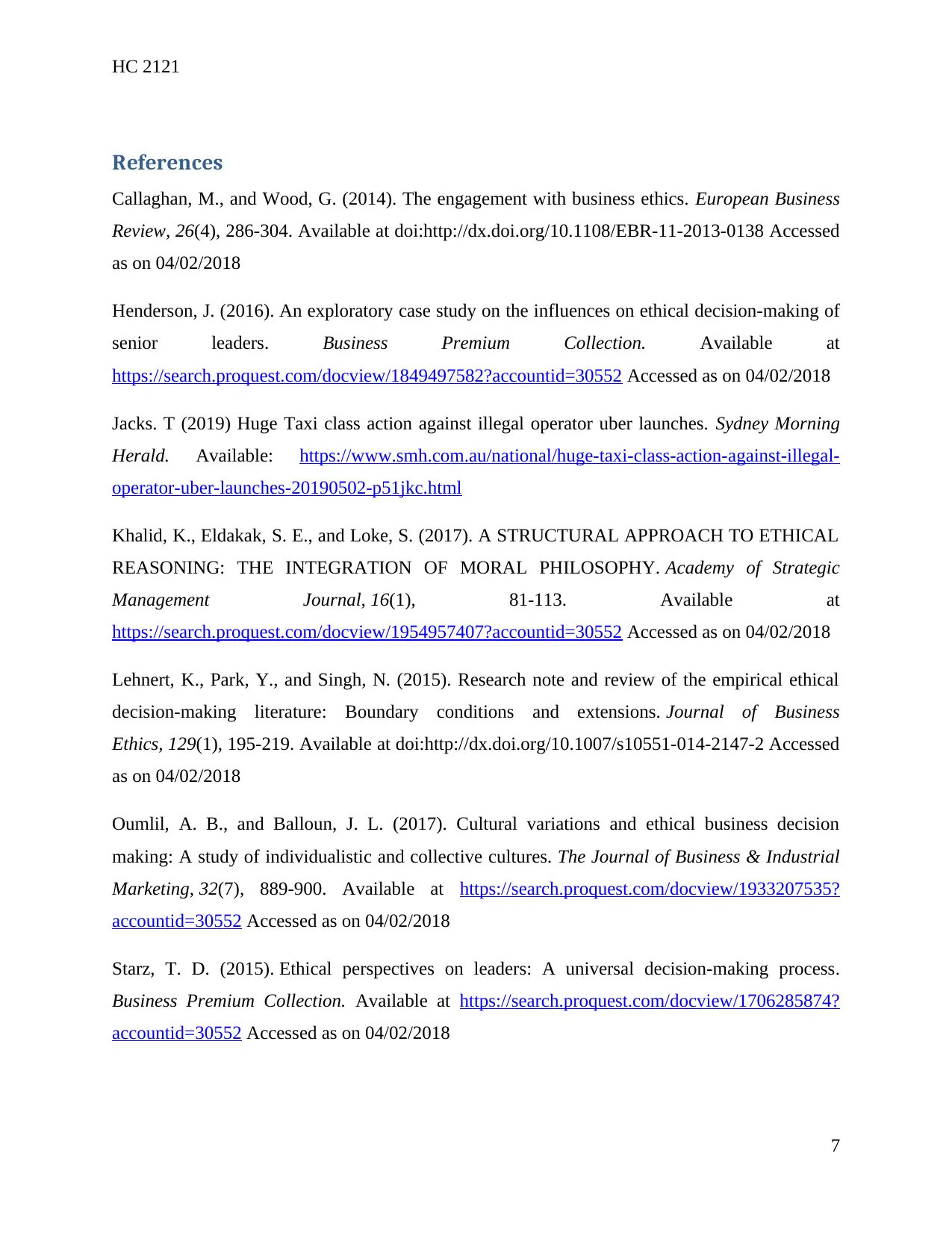
HC 2121
References
Callaghan, M., and Wood, G. (2014). The engagement with business ethics. European Business
Review, 26(4), 286-304. Available at doi:http://dx.doi.org/10.1108/EBR-11-2013-0138 Accessed
as on 04/02/2018
Henderson, J. (2016). An exploratory case study on the influences on ethical decision-making of
senior leaders. Business Premium Collection. Available at
https://search.proquest.com/docview/1849497582?accountid=30552 Accessed as on 04/02/2018
Jacks. T (2019) Huge Taxi class action against illegal operator uber launches. Sydney Morning
Herald. Available: https://www.smh.com.au/national/huge-taxi-class-action-against-illegal-
operator-uber-launches-20190502-p51jkc.html
Khalid, K., Eldakak, S. E., and Loke, S. (2017). A STRUCTURAL APPROACH TO ETHICAL
REASONING: THE INTEGRATION OF MORAL PHILOSOPHY. Academy of Strategic
Management Journal, 16(1), 81-113. Available at
https://search.proquest.com/docview/1954957407?accountid=30552 Accessed as on 04/02/2018
Lehnert, K., Park, Y., and Singh, N. (2015). Research note and review of the empirical ethical
decision-making literature: Boundary conditions and extensions. Journal of Business
Ethics, 129(1), 195-219. Available at doi:http://dx.doi.org/10.1007/s10551-014-2147-2 Accessed
as on 04/02/2018
Oumlil, A. B., and Balloun, J. L. (2017). Cultural variations and ethical business decision
making: A study of individualistic and collective cultures. The Journal of Business & Industrial
Marketing, 32(7), 889-900. Available at https://search.proquest.com/docview/1933207535?
accountid=30552 Accessed as on 04/02/2018
Starz, T. D. (2015). Ethical perspectives on leaders: A universal decision-making process.
Business Premium Collection. Available at https://search.proquest.com/docview/1706285874?
accountid=30552 Accessed as on 04/02/2018
7
References
Callaghan, M., and Wood, G. (2014). The engagement with business ethics. European Business
Review, 26(4), 286-304. Available at doi:http://dx.doi.org/10.1108/EBR-11-2013-0138 Accessed
as on 04/02/2018
Henderson, J. (2016). An exploratory case study on the influences on ethical decision-making of
senior leaders. Business Premium Collection. Available at
https://search.proquest.com/docview/1849497582?accountid=30552 Accessed as on 04/02/2018
Jacks. T (2019) Huge Taxi class action against illegal operator uber launches. Sydney Morning
Herald. Available: https://www.smh.com.au/national/huge-taxi-class-action-against-illegal-
operator-uber-launches-20190502-p51jkc.html
Khalid, K., Eldakak, S. E., and Loke, S. (2017). A STRUCTURAL APPROACH TO ETHICAL
REASONING: THE INTEGRATION OF MORAL PHILOSOPHY. Academy of Strategic
Management Journal, 16(1), 81-113. Available at
https://search.proquest.com/docview/1954957407?accountid=30552 Accessed as on 04/02/2018
Lehnert, K., Park, Y., and Singh, N. (2015). Research note and review of the empirical ethical
decision-making literature: Boundary conditions and extensions. Journal of Business
Ethics, 129(1), 195-219. Available at doi:http://dx.doi.org/10.1007/s10551-014-2147-2 Accessed
as on 04/02/2018
Oumlil, A. B., and Balloun, J. L. (2017). Cultural variations and ethical business decision
making: A study of individualistic and collective cultures. The Journal of Business & Industrial
Marketing, 32(7), 889-900. Available at https://search.proquest.com/docview/1933207535?
accountid=30552 Accessed as on 04/02/2018
Starz, T. D. (2015). Ethical perspectives on leaders: A universal decision-making process.
Business Premium Collection. Available at https://search.proquest.com/docview/1706285874?
accountid=30552 Accessed as on 04/02/2018
7
Paraphrase This Document
Need a fresh take? Get an instant paraphrase of this document with our AI Paraphraser
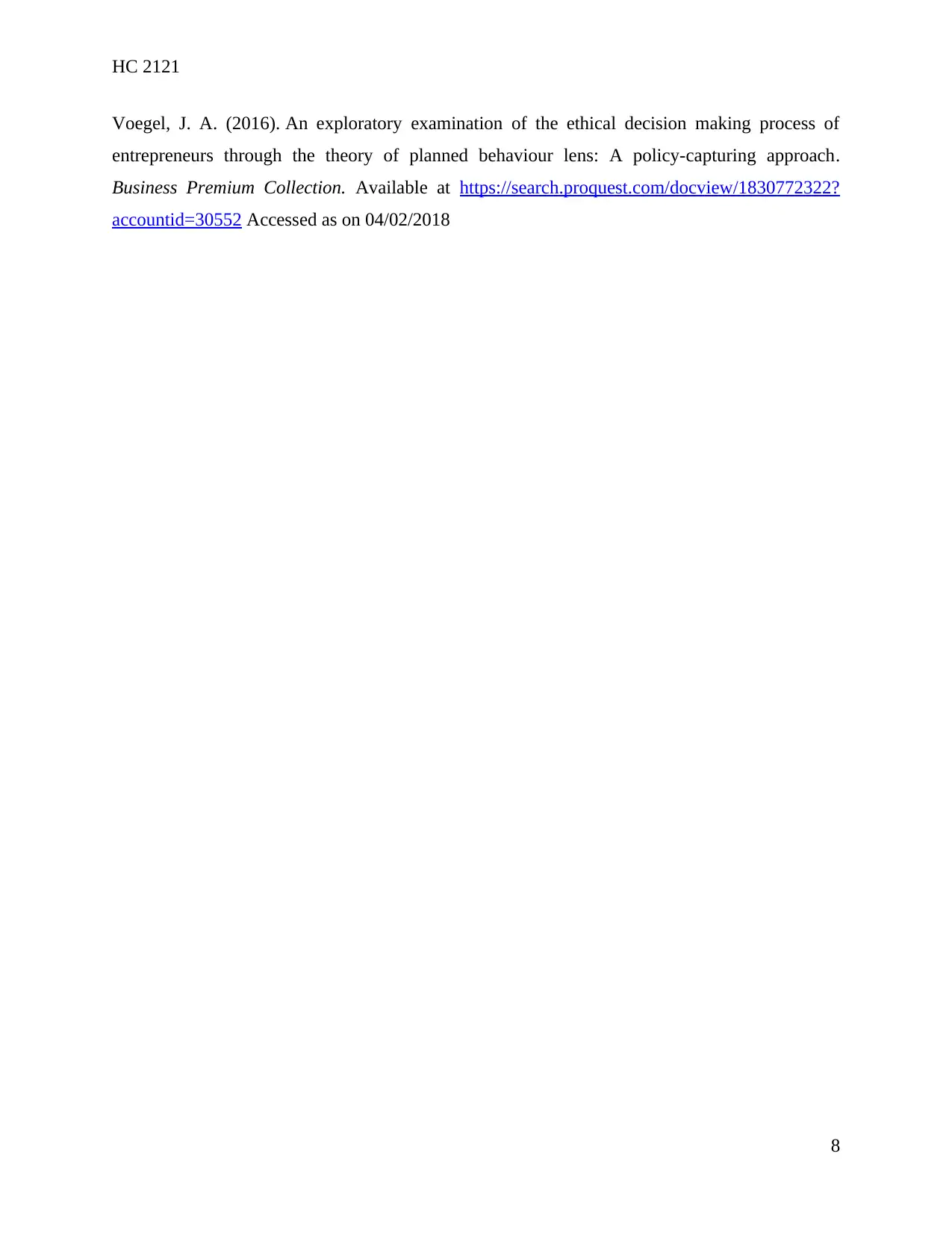
HC 2121
Voegel, J. A. (2016). An exploratory examination of the ethical decision making process of
entrepreneurs through the theory of planned behaviour lens: A policy-capturing approach.
Business Premium Collection. Available at https://search.proquest.com/docview/1830772322?
accountid=30552 Accessed as on 04/02/2018
8
Voegel, J. A. (2016). An exploratory examination of the ethical decision making process of
entrepreneurs through the theory of planned behaviour lens: A policy-capturing approach.
Business Premium Collection. Available at https://search.proquest.com/docview/1830772322?
accountid=30552 Accessed as on 04/02/2018
8
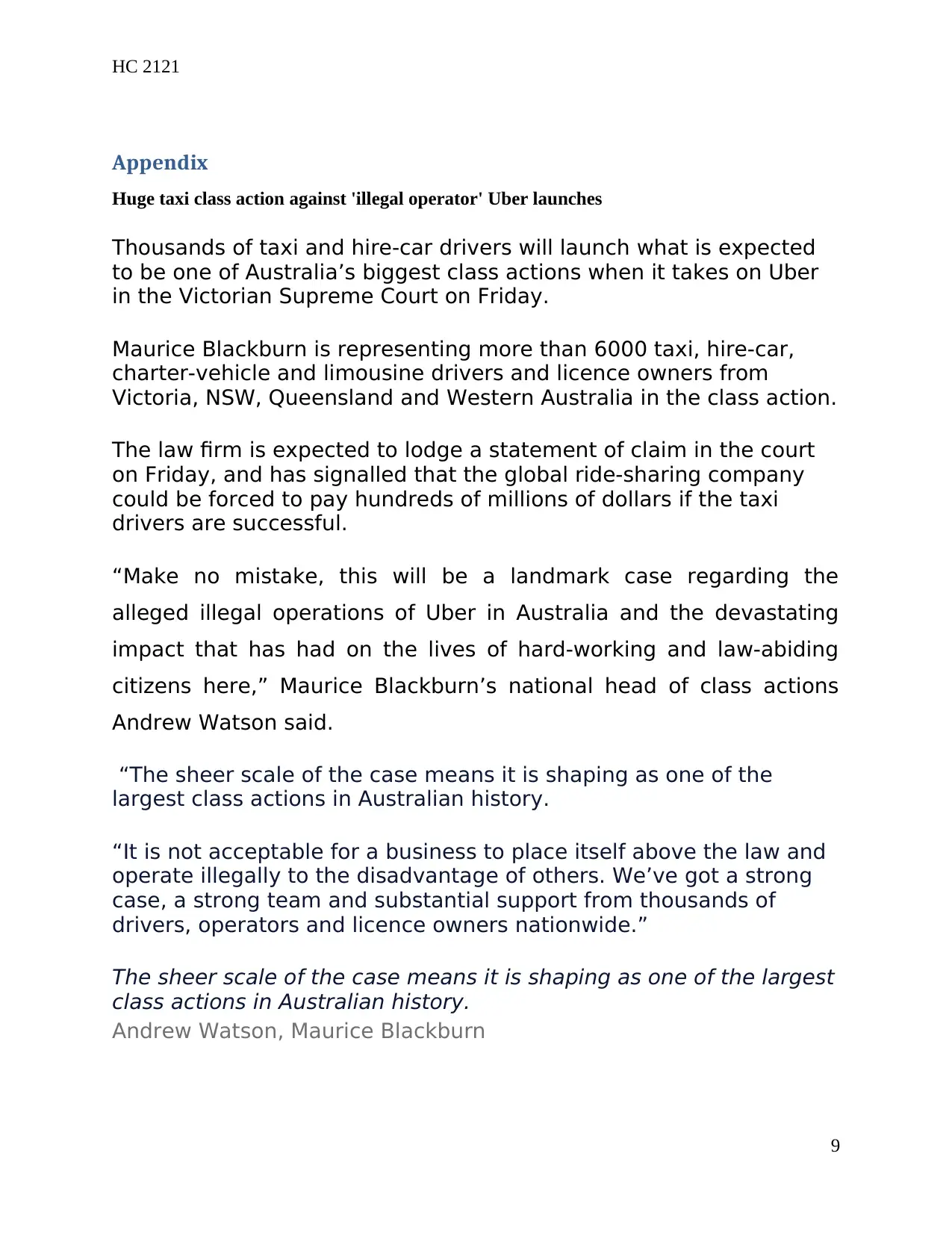
HC 2121
Appendix
Huge taxi class action against 'illegal operator' Uber launches
Thousands of taxi and hire-car drivers will launch what is expected
to be one of Australia’s biggest class actions when it takes on Uber
in the Victorian Supreme Court on Friday.
Maurice Blackburn is representing more than 6000 taxi, hire-car,
charter-vehicle and limousine drivers and licence owners from
Victoria, NSW, Queensland and Western Australia in the class action.
The law firm is expected to lodge a statement of claim in the court
on Friday, and has signalled that the global ride-sharing company
could be forced to pay hundreds of millions of dollars if the taxi
drivers are successful.
“Make no mistake, this will be a landmark case regarding the
alleged illegal operations of Uber in Australia and the devastating
impact that has had on the lives of hard-working and law-abiding
citizens here,” Maurice Blackburn’s national head of class actions
Andrew Watson said.
“The sheer scale of the case means it is shaping as one of the
largest class actions in Australian history.
“It is not acceptable for a business to place itself above the law and
operate illegally to the disadvantage of others. We’ve got a strong
case, a strong team and substantial support from thousands of
drivers, operators and licence owners nationwide.”
The sheer scale of the case means it is shaping as one of the largest
class actions in Australian history.
Andrew Watson, Maurice Blackburn
9
Appendix
Huge taxi class action against 'illegal operator' Uber launches
Thousands of taxi and hire-car drivers will launch what is expected
to be one of Australia’s biggest class actions when it takes on Uber
in the Victorian Supreme Court on Friday.
Maurice Blackburn is representing more than 6000 taxi, hire-car,
charter-vehicle and limousine drivers and licence owners from
Victoria, NSW, Queensland and Western Australia in the class action.
The law firm is expected to lodge a statement of claim in the court
on Friday, and has signalled that the global ride-sharing company
could be forced to pay hundreds of millions of dollars if the taxi
drivers are successful.
“Make no mistake, this will be a landmark case regarding the
alleged illegal operations of Uber in Australia and the devastating
impact that has had on the lives of hard-working and law-abiding
citizens here,” Maurice Blackburn’s national head of class actions
Andrew Watson said.
“The sheer scale of the case means it is shaping as one of the
largest class actions in Australian history.
“It is not acceptable for a business to place itself above the law and
operate illegally to the disadvantage of others. We’ve got a strong
case, a strong team and substantial support from thousands of
drivers, operators and licence owners nationwide.”
The sheer scale of the case means it is shaping as one of the largest
class actions in Australian history.
Andrew Watson, Maurice Blackburn
9
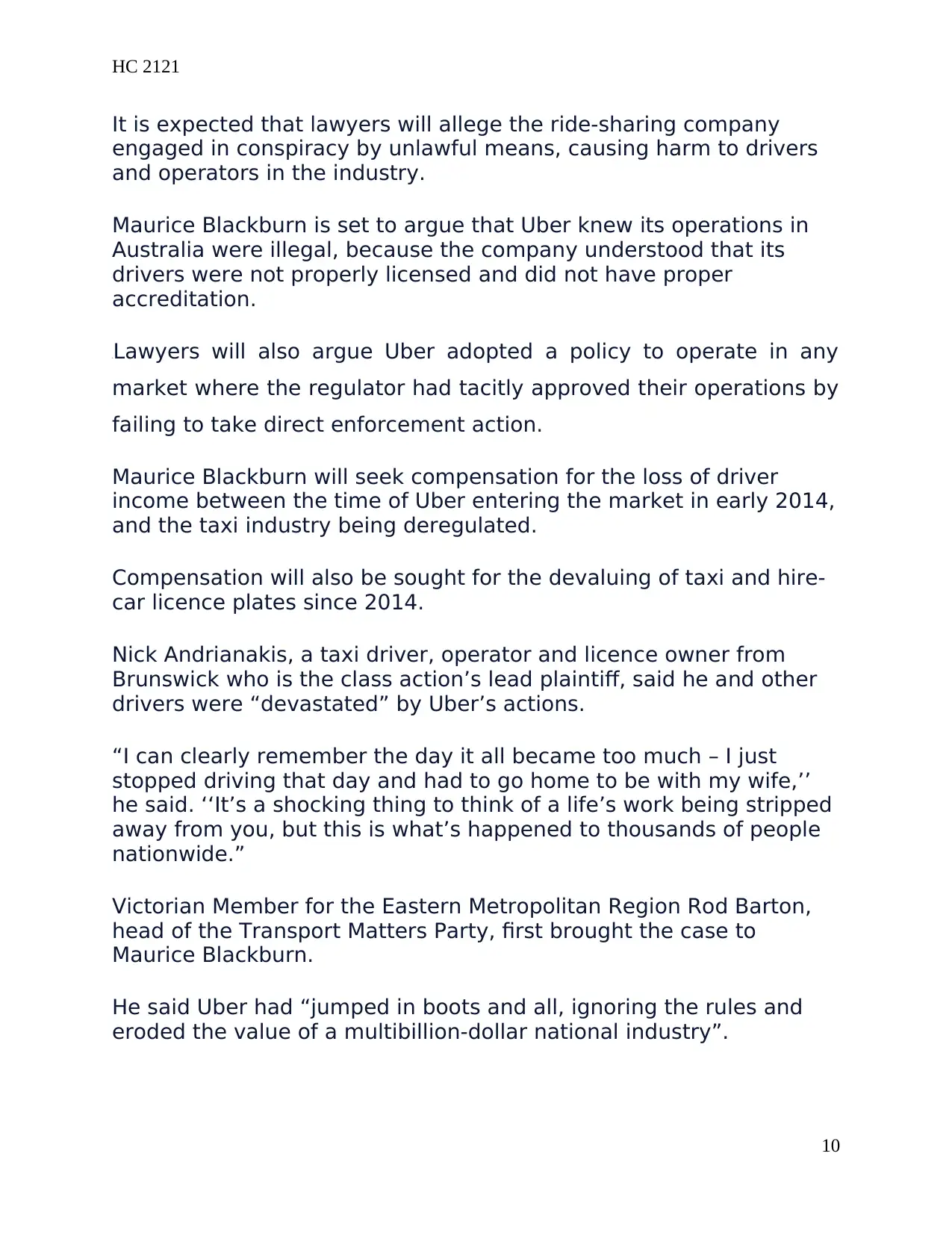
HC 2121
It is expected that lawyers will allege the ride-sharing company
engaged in conspiracy by unlawful means, causing harm to drivers
and operators in the industry.
Maurice Blackburn is set to argue that Uber knew its operations in
Australia were illegal, because the company understood that its
drivers were not properly licensed and did not have proper
accreditation.
ALawyers will also argue Uber adopted a policy to operate in any
market where the regulator had tacitly approved their operations by
failing to take direct enforcement action.
Maurice Blackburn will seek compensation for the loss of driver
income between the time of Uber entering the market in early 2014,
and the taxi industry being deregulated.
Compensation will also be sought for the devaluing of taxi and hire-
car licence plates since 2014.
Nick Andrianakis, a taxi driver, operator and licence owner from
Brunswick who is the class action’s lead plaintiff, said he and other
drivers were “devastated” by Uber’s actions.
“I can clearly remember the day it all became too much – I just
stopped driving that day and had to go home to be with my wife,’’
he said. ‘‘It’s a shocking thing to think of a life’s work being stripped
away from you, but this is what’s happened to thousands of people
nationwide.”
Victorian Member for the Eastern Metropolitan Region Rod Barton,
head of the Transport Matters Party, first brought the case to
Maurice Blackburn.
He said Uber had “jumped in boots and all, ignoring the rules and
eroded the value of a multibillion-dollar national industry”.
10
It is expected that lawyers will allege the ride-sharing company
engaged in conspiracy by unlawful means, causing harm to drivers
and operators in the industry.
Maurice Blackburn is set to argue that Uber knew its operations in
Australia were illegal, because the company understood that its
drivers were not properly licensed and did not have proper
accreditation.
ALawyers will also argue Uber adopted a policy to operate in any
market where the regulator had tacitly approved their operations by
failing to take direct enforcement action.
Maurice Blackburn will seek compensation for the loss of driver
income between the time of Uber entering the market in early 2014,
and the taxi industry being deregulated.
Compensation will also be sought for the devaluing of taxi and hire-
car licence plates since 2014.
Nick Andrianakis, a taxi driver, operator and licence owner from
Brunswick who is the class action’s lead plaintiff, said he and other
drivers were “devastated” by Uber’s actions.
“I can clearly remember the day it all became too much – I just
stopped driving that day and had to go home to be with my wife,’’
he said. ‘‘It’s a shocking thing to think of a life’s work being stripped
away from you, but this is what’s happened to thousands of people
nationwide.”
Victorian Member for the Eastern Metropolitan Region Rod Barton,
head of the Transport Matters Party, first brought the case to
Maurice Blackburn.
He said Uber had “jumped in boots and all, ignoring the rules and
eroded the value of a multibillion-dollar national industry”.
10
Secure Best Marks with AI Grader
Need help grading? Try our AI Grader for instant feedback on your assignments.
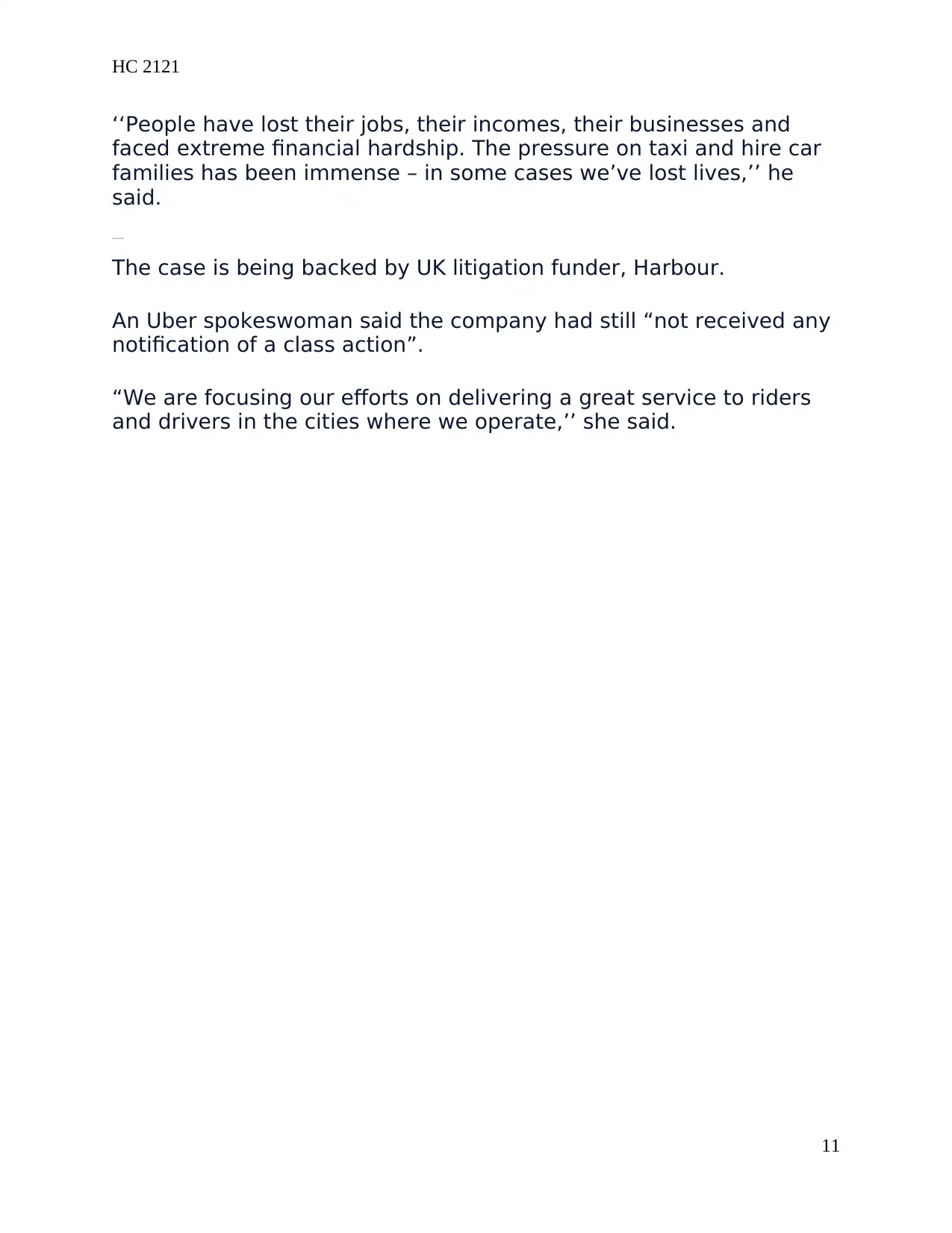
HC 2121
‘‘People have lost their jobs, their incomes, their businesses and
faced extreme financial hardship. The pressure on taxi and hire car
families has been immense – in some cases we’ve lost lives,’’ he
said.
Add to shortlist
The case is being backed by UK litigation funder, Harbour.
An Uber spokeswoman said the company had still “not received any
notification of a class action”.
“We are focusing our efforts on delivering a great service to riders
and drivers in the cities where we operate,’’ she said.
11
‘‘People have lost their jobs, their incomes, their businesses and
faced extreme financial hardship. The pressure on taxi and hire car
families has been immense – in some cases we’ve lost lives,’’ he
said.
Add to shortlist
The case is being backed by UK litigation funder, Harbour.
An Uber spokeswoman said the company had still “not received any
notification of a class action”.
“We are focusing our efforts on delivering a great service to riders
and drivers in the cities where we operate,’’ she said.
11
1 out of 11
Your All-in-One AI-Powered Toolkit for Academic Success.
+13062052269
info@desklib.com
Available 24*7 on WhatsApp / Email
![[object Object]](/_next/static/media/star-bottom.7253800d.svg)
Unlock your academic potential
© 2024 | Zucol Services PVT LTD | All rights reserved.